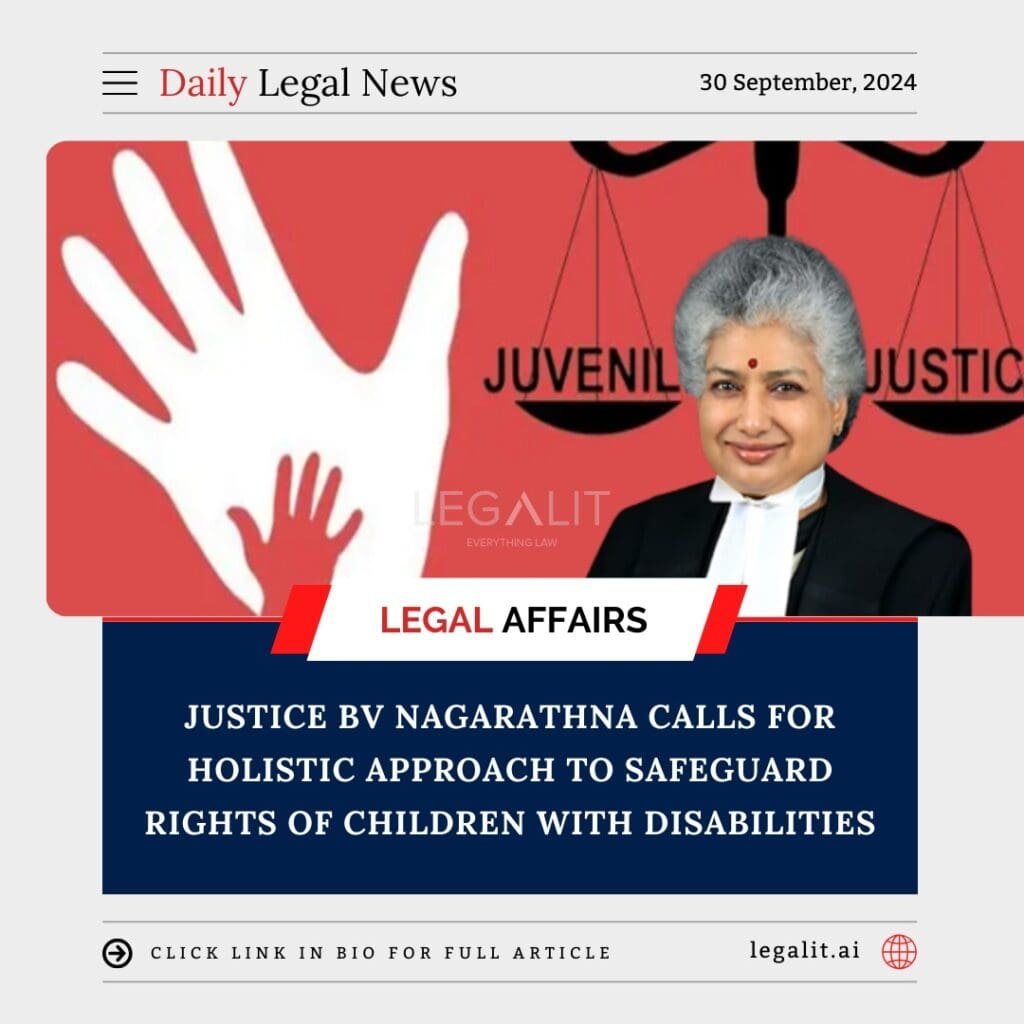
Justice BV Nagarathna, one of India’s most respected judges, has called for a comprehensive and holistic approach to protect and promote the rights of children with disabilities. In her recent address, Justice Nagarathna highlighted the need for a deeper understanding of the unique challenges faced by children with disabilities and the importance of ensuring their inclusion in society.
1. Emphasis on Inclusion and Empowerment
Justice Nagarathna’s message was clear: safeguarding the rights of children with disabilities requires more than just legal frameworks. It calls for a collective societal effort to create an inclusive environment where every child, regardless of their abilities, is given equal opportunities to thrive.
- Need for Inclusive Policies: Justice Nagarathna stressed that government policies and educational systems must adopt inclusive approaches that cater to the special needs of disabled children. This involves providing access to quality education, healthcare, and social services that are tailored to their specific requirements.
- Breaking Down Barriers: Physical, social, and attitudinal barriers often hinder children with disabilities from enjoying their full rights. Justice Nagarathna urged stakeholders to work towards eliminating these barriers and fostering a culture of acceptance, understanding, and support.
2. Legal Protections for Children with Disabilities
India has a robust legal framework to protect the rights of children with disabilities, including laws like the Rights of Persons with Disabilities Act, 2016. However, Justice Nagarathna pointed out that there are still gaps in the implementation and enforcement of these laws, which need to be addressed.
- Strengthening the Legal System: Justice Nagarathna highlighted the role of the judiciary in interpreting laws that impact children with disabilities. She called for the legal system to ensure that children are not only protected but also empowered through the laws that exist.
- Accessible Justice: Justice Nagarathna emphasized the importance of making legal systems more accessible to children with disabilities and their families. This includes creating mechanisms that allow for easier access to courts and ensuring that legal processes are adapted to meet their needs.
3. Focus on Education and Awareness
Justice Nagarathna stressed that education is one of the most powerful tools in empowering children with disabilities. She advocated for inclusive education systems where children with disabilities can learn alongside their peers, supported by special resources and trained educators.
- Special Education Programs: Justice Nagarathna called for the development of specialized educational programs that cater to children with various types of disabilities. She emphasized the importance of equipping teachers with the skills needed to support these children in mainstream classrooms.
- Raising Awareness: She also underlined the necessity of raising public awareness about the challenges faced by children with disabilities. Increased awareness can lead to greater empathy, understanding, and cooperation in ensuring that these children are not marginalized or excluded.
4. Healthcare and Rehabilitation Services
In her address, Justice Nagarathna also touched upon the critical need for accessible healthcare and rehabilitation services for children with disabilities.
- Early Intervention: She highlighted the importance of early diagnosis and intervention in ensuring that children with disabilities receive the care they need from a young age. Access to specialized healthcare, including physiotherapy, speech therapy, and counseling, is vital in improving their quality of life.
- Affordable Healthcare: Justice Nagarathna emphasized the need for healthcare services to be made affordable and accessible for all children with disabilities, especially those from economically disadvantaged backgrounds.
5. Social Support and Financial Assistance
Justice Nagarathna also called for enhanced social support systems and financial assistance to families of children with disabilities. She noted that many families struggle with the high costs of care, education, and healthcare, making it difficult for them to provide for their children’s needs.
- Financial Aid Programs: Justice Nagarathna advocated for stronger government programs that offer financial assistance to families, helping them access essential services such as specialized education and healthcare.
- Community Involvement: She also encouraged greater community involvement in supporting children with disabilities, through initiatives such as community centers and support groups that provide resources, guidance, and a sense of belonging.
6. Looking Forward: A Call for Collective Action
Justice BV Nagarathna’s call for a holistic approach to safeguarding the rights of children with disabilities serves as a powerful reminder that true inclusion requires the effort of every section of society. Governments, educators, healthcare providers, the judiciary, and communities must work together to ensure that children with disabilities have access to the same opportunities as their peers.
Her vision for the future is one where children with disabilities are not only protected but empowered to achieve their full potential, without facing discrimination or exclusion. Through a combination of legal protections, inclusive education, accessible healthcare, and social support, Justice Nagarathna hopes to create a society where every child, regardless of ability, can thrive.
Her address underscores the urgent need for all sectors of society to take responsibility in creating an environment that nurtures, supports, and uplifts children with disabilities, allowing them to live with dignity and independence.